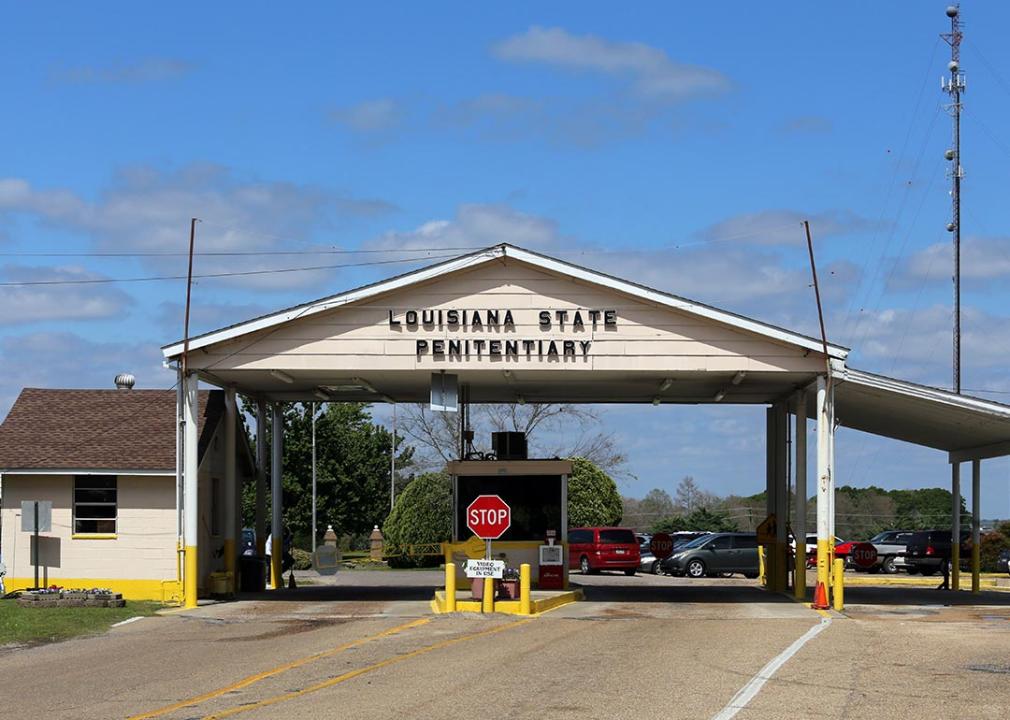
Katherine Welles // Shutterstock
Written by Jamiles Lartey for The Marshall Project
If you’ve shopped at Walmart, Target, Costco, Whole Foods or many other large grocery chains recently, there’s a chance you purchased food produced by prison labor, according to a years-long investigation published by The Associated Press this week. Beef, soybeans, corn and wheat are just some of the products that have found their way into consumer markets from prison farms and barns.
While a 1935 law makes it illegal to transport goods made by “convict labor” across state lines, an exemption exists for agricultural commodities that today amounts to hundreds of millions of dollars of commerce, according to The Associated Press’ reporting.
The Marshall Project found that the discovery itself isn’t totally novel. Reports dating back years have routinely revealed that prison labor is part of the American food supply chain. But by dispatching reporters to follow trucks leaving prison industries, The Associated Press was able to uncover some of the ways that these products are hidden in complex trade networks that obscure where things come from and where they go; often to be sold by corporations that claim not to use prison labor.
As the report notes, agriculture is actually just a small portion of the overall labor that incarcerated people do in prisons and jails nationwide. That includes both work in prisons tied to their daily maintenance, prison industries, and people who are leased out to work in the free world. For the vast majority, that work is barely paid (if at all), with the average prison salary maxing out at 52 cents per hour. A recently proposed raise in California and a recently passed raise in Pennsylvania were both measured in cents, not dollars. Prison labor is also performed without legal health and safety protections, even for extremely unsanitary or dangerous work, like fighting wildfires.
For many people in prison, jobs are done under threat of penalty. “What makes it forced…is that if you quit, you’re punished,” Johnny Perez told The Nation last year. Perez worked in textile manufacturing in the New York State prison system, making 32 cents an hour. He continued: “In prison, there’s no calling in [sick] for Covid; you’re going into solitary, or you’re going to get a behavior report.”
The deprivations of prison life create their own grim work incentives, even when it’s not built explicitly on punishment. Carla Simmons describes how the food has gone from bad to worse at her Georgia prison, and how she’s never full from kitchen meals alone. Georgia is one of a few remaining states where prisoners are generally paid nothing, and prison staff there reward work with quarterly “incentive meals” or the fleeting possibility of a prize bag full of (mostly expired) snacks. Simmons describes people jockeying for work assignments based on the likelihood of being able to fish a prison guard’s disposed food out of the trash. “The desire for a stable food source is a basic human need, and the carceral system operates by exploiting that desire,” Simmons writes.
The Associated Press investigation comes two months after a group of incarcerated people in Alabama sued the state prison system for creating what they call a “modern-day form of slavery.” The suit alleges that prison officials deny parole to worthy candidates in order to keep them in the state’s program that leases out prisoners to local businesses and governments. People who participate in these programs are legally required to be paid the prevailing wage for the job, but the corrections department is allowed to take 40%, and to charge fees for necessities like laundry and transportation to the job site.
The suit alleges that the state’s prison labor practices violate several laws, including the Alabama constitution, which, due to a recent amendment, bans slavery and involuntary servitude as punishment for crime. The amendment passed in 2022, when Alabama joined a handful of other states in ratifying the language. Since then, about a dozen more states have introduced similar proposals.
Such amendments don’t always have the impact that advocates intend. Colorado was the first state to pass one in 2018, but four years later incarcerated people there also filed a lawsuit against the prison system, arguing that the state still uses punishment to force prisoners to work against their will. The state said in court filings that it does take privileges away from people who refuse to work, but argued that this is different from punishment.
Like many people on the outside, people in prison often find deep purpose and satisfaction in work. For the Prison Journalism Project, Lexie Handlang describes how a job driving a tractor was the one thing that made her feel like a human behind bars, offering a sense of normalcy and a break from the monotony of life in her housing unit.
In a 2017 opinion article, Chandra Bozelko, who found similar fulfillment in her prison job, worried that political pressure against prison labor might actually be hurting incarcerated people. “Socially conscious businesses and agencies are likely to pay inmates higher wages, train them for better jobs and do more to prepare them for life after prison,” Bozelko reasoned, so it would be better “if those companies aren’t scared away by vociferous critics of prison labor.”
Bozelko argued that the best solution is for incarcerated workers to be allowed to unionize. Currently, the right to organize is one of the many labor protections that is not available in prisons, according to a 2022 report by the American Civil Liberties Union.
Others feel very differently. Ivan Kilgore views prison labor as a distraction from the degradations of the carceral system, and argues that to consider himself a “worker” in prison is to misunderstand the situation. “Prison work assignments, presented to us as privileges, serve to lure us into conformity with the prison’s disciplinary regime, amounting to complicity and participation in the production of our own continued enslavement,” Kilgore wrote for Inquest last year.
This story was produced by The Marshall Project, a nonpartisan, nonprofit news organization that seeks to create and sustain a sense of national urgency about the U.S. criminal justice system, and reviewed and distributed by Stacker Media.





